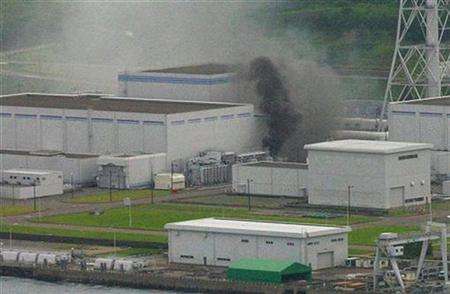Quake revives fears over Japan's nuclear industry

|
|
| Quake revives fears over Japan's nuclear industry Black smoke is seen spewing from an electricity transformer at Tokyo Electric Power Co.'s Kashiwazaki-Kariwa No.3 nuclear power generation unit in Kashiwazaki, northern Japan, July 16, 2007. Tokyo Electric Power Co. shut down three major generators at the world's biggest nuclear power plant after a powerful earthquake in Japan on Monday caused a brief fire in one of the units, company officials said. REUTERS/Japan Coast Guard/Handout |
By Isabel Reynolds
TOKYO (Reuters) - An earthquake-triggered leak and fire at the world's biggest nuclear plant have renewed safety fears in energy-hungry Japan, which relies on nuclear technology for about a third of its electricity.
But anxiety over quakes as well as past accidents and cover-ups is unlikely to derail Japan's nuclear energy programme, often touted as a way of keeping down emissions of the gases that cause global warming.
Tokyo Electric Power Co. only announced that 1,200 liters of radioactive water had sloshed into the sea from its Kashiwazaki-Kariwa plant late on Monday, after first saying the lethal earthquake that hit the region at 10:13 a.m. had not caused any leaks.
The incident drew a harsh response from top government officials, who said TEPCO's response had been slow.
"I believe that nuclear power plants can only be operated with the trust of the people," Prime Minister Shinzo Abe told reporters.
"For this, if something happens they need to report on it thoroughly and quickly. We need to get them to strictly reflect on this incident," he added.
TEPCO, Asia's biggest utility, said the quake was bigger than it had planned for, but that there was no effect on the environment from Monday's leak and that it was well within government-permitted radiation limits.
But the delayed reporting of the incident may add to mistrust after TEPCO and another electric power firm admitted this year that they had covered up "criticality" incidents -- unintended self-sustaining nuclear fission chain reactions -- in the past.
Further information trickled out on Tuesday, when the company said small amounts of radioactive materials -- cobalt-60, iodine and chromium-51 -- had been emitted into the atmosphere. But a trade ministry official said the amounts were too small to pose an environmental threat.
About 100 drums containing low-level nuclear waste were knocked over by the quake and some lost their lids, Kyodo news service said on Tuesday.
SHAKEN TRUST
A previous scandal over fudged safety inspections shook public faith in the industry five years ago.
"It's the kind of thing that could happen at any time. But I am surprised that they don't make proper preparations for earthquakes," said Baku Nishio of the Citizen's Nuclear Information Centre, a group that campaigns against nuclear power.
"Japan is particularly prone to earthquakes, so I think it's a major problem," he added.
Japan is one of the world's most seismically active countries, and a tremor occurs at least every five minutes.
Some nuclear experts disagreed.
"Personally I think a nuclear power plant is the safest place you could go in an earthquake," said Hisashi Ninokata, a nuclear engineering professor at Tokyo Institute of Technology. "That's how much care they take over construction."
U.S. nuclear regulators, who oversee 104 civilian reactors in the United States, compared with the 55 in Japan, said on Monday they were ready to send technical experts to Japan if help was required.
One of the nation's worst nuclear accidents took place in September 1999, when workers at a nuclear facility in Tokaimura, northeast of Tokyo, set off an uncontrolled chain reaction by using buckets to mix nuclear fuel. Two workers were killed.
In 2004, four workers at a nuclear power plant were killed by a leak of high-pressure steam from a pipe.
Some Japanese say they would be happy to see nuclear power phased out altogether, despite the country's lack of natural resources.
"Even if it means having to live with less electricity, we should get rid of nuclear reactors once and for all. There are just too many natural disasters," said 61-year-old Naoko Yashiro, who runs a ceramics shop in Kashiwazaki, close to the nuclear plant, with her husband, Kazuo.
But Kazuo said such drastic action was not practical, given Japan's reliance on the technology and the economic benefits to the local community.
"In reality that's going to be difficult," he said.
There are currently 13 nuclear generators under construction in Japan and the government's policy is to continue to rely on nuclear power for 30 to 40 percent of the country's electricity requirements.
© 1996-2007 Scientific American, Inc. All rights reserved.